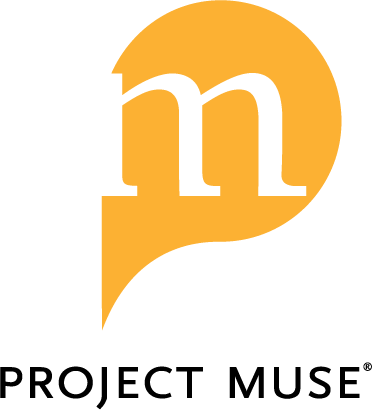Gale Literature
 Searches all Gale literature databases at once: Gale Literature Criticism, Gale Literature Resource Center, LitFinder, Scribner Writers Series, Twayne's Author Series, Something About the Author, and the Dictionary of Literary Biography.
Searches all Gale literature databases at once: Gale Literature Criticism, Gale Literature Resource Center, LitFinder, Scribner Writers Series, Twayne's Author Series, Something About the Author, and the Dictionary of Literary Biography.
Salem Literature
 Literary analysis of authors, their novels and poetry, and literary themes.
Literary analysis of authors, their novels and poetry, and literary themes.
Something About the Author
Encyclopedia entries on the lives and works of authors and illustrators for children and young adults.
Project MUSE
 Journal articles and books on literature, history, visual and performing arts, cultural studies, education, political science, gender studies, and more.
Journal articles and books on literature, history, visual and performing arts, cultural studies, education, political science, gender studies, and more.
JSTOR
 Scholarly articles, ebooks, and primary sources in the social sciences, humanities, earth and biological sciences, and more. Includes images from libraries, museums, and archives.
Scholarly articles, ebooks, and primary sources in the social sciences, humanities, earth and biological sciences, and more. Includes images from libraries, museums, and archives.
Still stuck? The Library has lots of databases. Try looking in this list for more options:
All Library Databases by Subject/Type
All of the library's online collections, organized by subject or type.
 Searches all Gale literature databases at once: Gale Literature Criticism, Gale Literature Resource Center, LitFinder, Scribner Writers Series, Twayne's Author Series, Something About the Author, and the Dictionary of Literary Biography.
Searches all Gale literature databases at once: Gale Literature Criticism, Gale Literature Resource Center, LitFinder, Scribner Writers Series, Twayne's Author Series, Something About the Author, and the Dictionary of Literary Biography. Salem Literature
 Literary analysis of authors, their novels and poetry, and literary themes.
Literary analysis of authors, their novels and poetry, and literary themes. Something About the Author
Encyclopedia entries on the lives and works of authors and illustrators for children and young adults.
Project MUSE
 Journal articles and books on literature, history, visual and performing arts, cultural studies, education, political science, gender studies, and more.
Journal articles and books on literature, history, visual and performing arts, cultural studies, education, political science, gender studies, and more. JSTOR
 Scholarly articles, ebooks, and primary sources in the social sciences, humanities, earth and biological sciences, and more. Includes images from libraries, museums, and archives.
Scholarly articles, ebooks, and primary sources in the social sciences, humanities, earth and biological sciences, and more. Includes images from libraries, museums, and archives. Still stuck? The Library has lots of databases. Try looking in this list for more options:
All Library Databases by Subject/Type
All of the library's online collections, organized by subject or type.
MLA Quick Guide (PDF)
See MLA citation examples for the most common types of sources (9th edition).
MLA Formatting and Style Guide (OWL at Purdue)
This website offers examples for the general format of MLA research papers, in-text citations, and the Works Cited page. Uses MLA 9th edition.
See MLA citation examples for the most common types of sources (9th edition).
MLA Formatting and Style Guide (OWL at Purdue)
This website offers examples for the general format of MLA research papers, in-text citations, and the Works Cited page. Uses MLA 9th edition.
Picking a Research Topic
Narrowing down your research topic makes your research easier and increases your ability to persuade your audience. As you begin researching, look for opportunities to narrow your research question.
Choosing and Using Keywords
If you can’t find much on your topic, try different keywords. Using synonyms or broader related terms can help you find more articles. As you research, be on the lookout for new keywords to use.
Research is a process. You probably won’t find everything you need on the first try. You may have to try several library databases to find all the information you need.
Narrowing down your research topic makes your research easier and increases your ability to persuade your audience. As you begin researching, look for opportunities to narrow your research question.
Choosing and Using Keywords
If you can’t find much on your topic, try different keywords. Using synonyms or broader related terms can help you find more articles. As you research, be on the lookout for new keywords to use.
Research is a process. You probably won’t find everything you need on the first try. You may have to try several library databases to find all the information you need.

Call, e-mail, or chat with a librarian for more research assistance. We're happy to help!
(952) 358-8290
Email
 David Vrieze Daniels
David Vrieze DanielsReference and Instruction Librarian
david.vriezedaniels@normandale.edu
Note: Your chat question may be directed to a librarian from another college when Normandale librarians are unavailable.
Evaluate each source you use with CAPPS!
Consider the source's –
Consider the source's –
C = Currency
A = Author
P = Publication
P = Point of View
S = Sources
More info about CAPPS A = Author
P = Publication
P = Point of View
S = Sources
Online Library Access Info
To access databases and other Library resources, login with your StarID and password when prompted. Access is only available to current Normandale students and employees.
To access databases and other Library resources, login with your StarID and password when prompted. Access is only available to current Normandale students and employees.